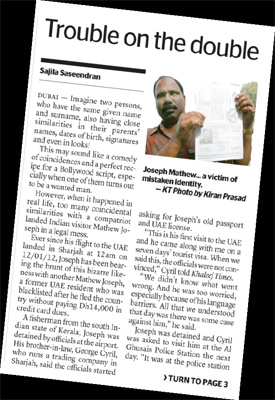 Dubai, April 4: Freedom is in sight for Indian fisherman Mathew Joseph who has been held in the UAE for nearly three months in an unusual case of mistaken identity. The Indian mission here has promised to intervene in his case after verifying that he is not the wanted man Mathew Joseph with whom the former had bizarre likeness in many things.
Dubai, April 4: Freedom is in sight for Indian fisherman Mathew Joseph who has been held in the UAE for nearly three months in an unusual case of mistaken identity. The Indian mission here has promised to intervene in his case after verifying that he is not the wanted man Mathew Joseph with whom the former had bizarre likeness in many things.
After Khaleej Times published his plight on Monday, the Indian Consulate in Dubai, which had earlier verified the fisherman’s passport as genuine, secured the passport copy of the wanted man, who had worked as a driver in Dubai, through this newspaper.
On Tuesday, the Consulate informed that the passport of the driver, which was issued by itself in 2004, was also genuine. “From the official records, both the passports (of the same name) were found to be genuine,” the Consulate said in a written statement to KT. “The issue will be taken up by the Consulate with the local authorities concerned,” it added.Also, Minister of Overseas Indian Affairs Vayalar Ravi, who was in Dubai on Tuesday, said he would instruct the Indian mission to pay the fines that Joseph would face for overstay.
On hearing the glad news, Joseph said: “I don’t know how to thank Khaleej Times for this... I wish the Consulate had done the same in January when we had approached it for help.”
The father of three schoolgoing girls said not even Dh1 billion could cure the trauma that he and his family had gone through.
Joseph, 47, was held by officials at the Sharjah International Airport on January 12 when he landed in the UAE for the first time with his brother-in-law George Cyril. He was arrested because of the close similarities he had in his full name, parents’ names, dates of birth, signatures and even in looks with that of his fellow citizen who had fled the UAE in 2010 without paying Dh14, 000 in credit card dues.
Ever since he secured bail after three days by keeping Cyril’s passport as a guarantee, Joseph had been struggling to establish that he is not the one who cheated the bank in Dubai.





Comments
Add new comment